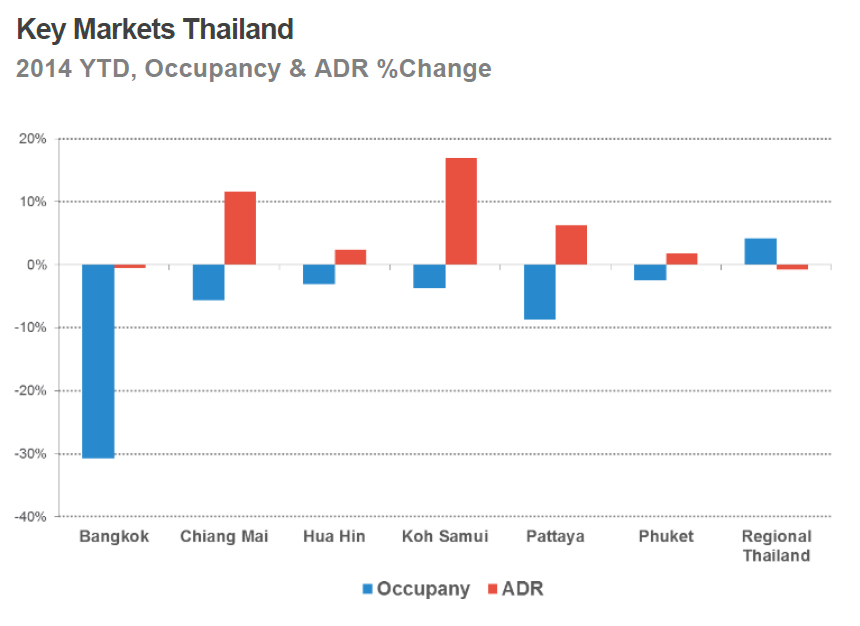The WPJ
THE WORLD PROPERTY JOURNALReal Estate Facts Not Fiction
Vacation Real Estate News

Political Unrest Damaging Bangkok's Hotel Market
Vacation News » Asia Pacific Vacation News Edition | By Michael Gerrity | May 13, 2014 8:41 AM ET
According to STR Global, Bangkok's hotel market reported significant performance decreases during the first quarter of 2014, affecting Thailand's overall performance.
In the first quarter, occupancy fell 30.7 percent to 55.2 percent (compared to 79.7 percent in Q1 2013); revenue per available room dropped 31.2 percent to THB1,778.42; and average daily rate fell by 0.6 percent to THB3,221.60. Demand in the market also reported a significant decrease, falling 29.3 percent.
"The hotel industry in Bangkok has taken a hit as a result of the political unrest", said Elizabeth Winkle, managing director of STR Global. "2013 was a good year for hotels in Bangkok; however, 2014 is off to a rough start for the market. In February and March, Bangkok reported the lowest occupancy figures since August 2010. The greatest concern is the uncertainty of how long the conflict will last".
Contrary to Bangkok, major resort locations in Thailand experienced a slight fall in occupancy due to increased rates to compensate for the negative trend. This resulted in a positive RevPAR performance in these markets.
Regional Thailand was the only market in this country that was able to increase occupancy during the first quarter, while ADR slightly declined.
Resort markets, such as Koh Samui and Phuket, traditionally command higher rates than Bangkok. The recent unrest has increased the gap even further. Rates in Koh Samui in Q1 2014 were nearly three times higher than in Bangkok.
Overall, Thailand's performance in Q1 has been dampened by Bangkok, as demand fell 16.6 percent, and the country reported the lowest occupancy levels (65.7 percent) of any first quarter since 2009.
This negative performance is off the back of Thailand's positive performance in 2013, where occupancy (+6.3 percent) and ADR (+6.5 percent) grew almost at the same pace. This resulted in double-digit growth in RevPAR for the third year in a row to THB2,564.59 (+13.2 percent),exceeding pre-recession peaks in this measure for the first time.

Sign Up Free | The WPJ Weekly Newsletter
Relevant real estate news.
Actionable market intelligence.
Right to your inbox every week.
Real Estate Listings Showcase
Related News Stories
Vacation Real Estate Headlines
- Asia Pacific Hotel Revenues to Rise in 2024 Despite Economic Volatility
- Tourist Bookings to Hawaii Down 50 Percent Since Maui Wildfires
- Demand for Vacation Homes in U.S. Hit 7-Year Low in August
- International Travel for Americans Jumps Over 200 Percent in 2023
- U.S. Labor Day Weekend Travel To Uptick in 2023
- Asia Pacific Hotel Investment Collapses 51 Percent in 2023
- As Summer Travel Season Winds Down, U.S. Gas Prices Rise Again
- Record Setting 50.7 Million Americans to Travel This July Fourth Holiday
- Israel Hotels Poised for Growth as International Visitors Set to Return
- Over 42 Million Americans to Travel This Memorial Holiday Weekend
- European Hotel Transactions Decline 18 Percent in 2022 as Interest Rates Surge
- U.S. Vacation Home Demand Dives 50 Percent from Pre-Pandemic Levels
- European Hotel Values Upticked 3 Percent in 2022
- U.S. Vacation Rental Bookings Rise 27 Percent Annually in January
- Third-Party Hotel Operators Set to Increase Across Europe in 2023
- 113 Million People Traveling in the U.S. During the 2022 Holiday Season
- London Hotels Set to Weather High Inflation in 2022
- Almost 55 Million People to Travel This Thanksgiving Holiday in America
- Düsseldorf Hotels Enjoy Growing Corporate Demand in 2022
- Global Hotel Investment Activity in Asia Pacific to Rise 80 Percent in 2022
- Japan Lifts Foreign Inbound Covid Travel Restrictions in October
- Demand for Second Vacation Homes in the U.S. Decline
- Amsterdam Hotels Enjoy Comeback Post Covid Travel Restrictions
- 47.9 Million Americans Will Travel This July 4th Weekend
- High Prices, Rising Rates, Economic Uncertainty Ends Vacation Home Boom in America
- My Top 3 July Fourth Vacation Getaways in America Revealed for 2022
- Post Covid, New York City Hotel Market on the Road to Recovery
- Fast Rising Gas Prices to Impede U.S. Vacation Travel in H2 of 2022
- Post-Covid, Paris Hotel Sector Set for Strong Recovery as Demand Grows
- Singapore Hotel Demand to Accelerate in Late 2022
- 39.2 Million Americans to Travel Memorial Weekend, Says AAA
- Covid Driven Vacation Home Boom in America Now Ending in 2022
- Turks and Caicos Vacation Home Sales Enjoy Record-Breaking 2021
- Asia Pacific Hotel Sector Enjoys $8.5 Billion of Investment in 2021
- London Hotels Enjoying a Flight to Quality
- Demand for Vacation Homes Up 77 Percent From Pre-Pandemic Levels
- Even With Omicron, 109 Million Americans Traveling for the Holidays in 2021
- U.S. Vacation Home Demand Still Strong in Late 2021
- Top 5 Christmas Getaways in America Revealed
- Vacation Home Markets in the U.S. Remain Strong
Reader Poll
Marketplace Links
This website uses cookies to improve user experience. By using our website you consent in accordance with our Cookie Policy. Read More





